- Home
- M G Vassanji
The Gunny Sack
The Gunny Sack Read online
Also by MG Vassanji
The In-Between World of Vikram Lall
Amriika
The Book of Secrets
No New Land
Uhuru Street
Copyright © M.G. Vassanji 1989
Anchor Canada edition 2005
All rights reserved. The use of any part of this publication, reproduced, transmitted in any form or by any means electronic, mechanical, photocopying, recording or otherwise, or stored in a retrieval system without the prior written consent of the publisher—or, in the case of photocopying or other reprographic copying, a license from the Canadian Copyright Licensing Agency—is an infringement of the copyright law.
Anchor Canada and colophon are trademarks.
LIBRARY AND ARCHIVES CANADA CATALOGUING IN PUBLICATION
Vassanji, M. G.
The gunny sack / M.G. Vassanji.
eISBN: 978-0-307-37515-5
I. Title.
PS8593.A87G8 2005 C813′.54 C2004-906896-2
Excerpt from “Vacillation” by W. B. Yeats from The Poems of W. B. Yeats, edited by Richard J. Finneran © 1933, Macmillan Publishing Company,
renewed 1961 by Bertha Georgie Yeats.
Excerpt from “Utendi wa Inkishafi” in Anthology of Swahili Poetry, edited by Ali A. Jahadhmy, Heinemann Educational Books (East Africa), Nairobi, 1975.
Published in Canada by
Anchor Canada, a division of
Random House of Canada Limited
Visit Random House of Canada Limited’s website: www.randomhouse.ca
v3.1
For Nuru,
With gratitude
From man’s blood-sodden heart are sprung
Those branches of the night and day
Where the gaudy moon is hung.
What’s the meaning of all song?
“Let all things pass away.”
W. B. Yeats
enga taa katika pepo
haiziwiliki izimikapo sasa mi
huona izimishiye
[Behold the lantern in the wind
now beyond help
you see it extinguished]
Acknowledgements.
My thanks to Zulfikar Ghose, Réshard Gool, Peter Nazareth for encouragement; Kulsum Bai Hasham for conversations; Vicky Unwin and AWS for being there; the Ontario Arts Council and Multiculturalism Directorate (Canada) for assistance; David Rowe for kindness. Also to Jane Harley for her patience with the gunny and Susheila Nasta for an exhaustive reading of it, and to Nizar Ebrahim for hospitality. I am indebted to Mzee Salum Majutu and Baraka Hamisi for a pointer on vocabulary.
Author’s Note.
The non-English words—which are mostly in Swahili or Cutchi-Gujarati—are intended to be integral to the text. In most cases their meanings are obvious in context, or explicit. The Glossary provided should be useful, but I hope it is not so necessary as to become an impediment. In using it the reader should bear in mind that the meanings given are particular to a place, time, and group of people and might not agree with dictionaries. I have also taken liberties with language, using “Swahili” for “Kiswahili” and English plural forms for Swahili words. Thus: Mshenzis, Mdachis. These usages have not been entirely uncommon. The map should make some places more concrete but I hope, like the Glossary, it is ultimately dispensable. This is a work of fiction, with some historical events and characters as background. The Shamsi community is fictitious, as are the towns Kaboya and Matamu and much else.
Contents.
Cover
Other Books by This Author
Title Page
Copyright
Dedication
Epigraph
Acknowledgements
Author’s Note
Map
PART 1 Ji Bai
Shehrbanoo.
The two jewels.
As strong as Bhima.
The spirits of times past.
The sin of one man.
The suffering mukhi.
PART 2 Kulsum
View from the birij.
How I killed my father.
Dar es Salaam.
Habib Mansion.
God, two queens and the Famous Five.
Forbidden fruit.
Cricket and elections.
Boyschool and independence.
Red skies and Western eyes.
These dreams, ready made and gone.
PART 3 Amina
Big black trunk.
Dar, Massachusetts, New York, and the moon.
Britannia’s children.
Deluge and a new saviour.
Marriage of minds: alliances.
And the final night.
Glossary
About the Author
Part 1.
Ji Bai.
SHEHRBANOO.
Memory, Ji Bai would say, is this old sack here, this poor dear that nobody has any use for any more. Stroking the sagging brown shape with affection she would drag it closer, to sit at her feet like a favourite child. In would plunge her hand through the gaping hole of a mouth, and she would rummage inside. Now you feel this thing here, you fondle that one, you bring out this naughty little nut and everything else in it rearranges itself. Out would come from the dusty depths some knickknack of yesteryear: a bead necklace shorn of its polish; a rolled-up torn photograph; a cowrie shell; a brass incense holder; a Swahili cap so softened by age that it folded neatly into a small square; a broken rosary tied up crudely to save the remaining beads; a bloodstained muslin shirt; a little book. There were three books in that old gunny that never left her bedside, four-by-six-inch, green, tablet-like, the front cover folding over into a flap fastened with a tiny padlock! On the cover of each, neatly carved, two faded inscriptions in gold, wriggling in opposite directions: one in an Arabic-looking hand, the other indecipherable, supposedly in a secret script. “He who opens it will suffer the consequences,” she, who did not read, would gravely pronounce to her awed listener.
We buried Ji Bai a few weeks ago on a cold November afternoon …
From near and far, young and old, they came to see her go, in this small overseas community. Not that many here knew her or had even heard of her; she was only passing through, a traveller. But they would go away the wiser, about her and themselves and the common links between them. Such are the merits of a funeral. The converted supermarket was half full. The old, the exiled old, sitting on chairs on one side, visible but unobtrusive, outwardly implacable and unperturbed, watching the funeral ceremony proceeding with clockwork precision in the hands of the Westernised funeral committee. What thoughts behind those stony masks? The rest of the congregation, the younger members, sat on the floor, facing the ceremony. With practised precision, with appropriate gravity of speech and bearing, the head of the committee led formations of select relatives and friends to partake in the more intimate rituals. She lay inside a raised open coffin, a younger, doll-like Ji Bai, face flushed pink but hideous and grim. What have they done to you, Ji Bai? Someone had taken the pains to iron out every wrinkle on her face, to clean out the grey, to stretch the skin taut like a cellophane wrapper. Once, when time was plenty and the hourglass slow, every man, woman and child present would come and kneel before the dead and beg forgiveness and pay their last respects. Now, in collective homage the congregation filed past the pink face in the coffin; the women took their seats, the men formed two closely spaced rows. A sob stifled, a wail choked (practised wailers, some of these), the coffin was closed.
“Stand back,” said the leader, gruffly. “Stand back!”
“Praise the Prophet!” The coffin was slowly if shakily lifted on to the shoulders of the male relatives and the committee members. Then it took purchase and at shoulder height bobbed away easily like a boat in a slight c
urrent, between the two rows of males, as anyone who could gave it a shoulder or even a slight shove on its way to be rolled into the black funeral car outside. An older, experienced voice, rich with feeling, took away the chant:
There is none but Him
There is none but Him
There is none but Him
—and Muhammad is His Prophet …
(Once, a rickety yellow and green truck with men sitting on both sides of the coffin at the back chanting the shahada, at the sight of which pedestrians would stop and fold their hands in respect.)
Afterwards, I watched from a distance the last clod of earth thrown perfunctorily on the grave, the last of the congregation—how can I call them mourners?—leave. Someone made a gesture in my direction but then thought the better of it. I was left alone. Trees rustled in the wind, dead leaves scraped the ground. In the distance another burial was in progress, this one more opulent, its mourners in black, with bigger and better wreaths, bigger and better cars. Traffic zipped along the highway. What cold comfort, Ji Bai, I thought. Even worms couldn’t survive in such a grave. I had a vision of her small frail body under six feet of cold earth that would soon freeze. I could see the body shrink, under icy pressure, the skin dry and peel off and fly away like a kite, the skeleton rattle and fold and rearrange itself to form a neat square heap like the firewood that was once sold outside her store in Dar.
A week later Aziz her grand nephew stumbled in to see me with a large blue vinyl suitcase.
“With the compliments of Ji Bai!” he announced cheerfully.
“What? A suitcase?”
A vinyl legacy from a vinyl-faced Ji Bai? No … The twinkle in his eyes recalled the mischief in Ji Bai’s, as with a flourish he proceeded to lay it on its side, and like a salesman swung it open as if to display its capacity and interior. A ball of kapok glided out and sailed away.
“The gunny sack,” he spoke, the same instant I saw it, brown and dusty, looking threatened and helpless in the brand-new interior. It was drawn loosely shut with a sisal string. “You used to sit before it so long, she thought it should be yours.”
“Isn’t it rightfully yours?” I asked.
“No. It’s yours. She wanted you to have it.”
“Come, come … what if she had died there? Would you have posted it?”
“But she died here.”
Young Aziz, he knew more than he let on. He was Ji Bai’s companion during the last few years of her life. She had said she would travel, and Aziz accompanied her, first to India then here. Wherever she went, her gunny went with her. Did she know she would die in this foreign place, then? With Ji Bai there was no telling.
He said, “If my family had had their way they would have burnt it long ago. It’s brought nothing but bad luck, they say. They want you to burn it, once and for all to bury the past.”
“And you—do you want me to burn it?”
“Look at it first—it’s what she wanted, after all. Then, maybe burn it. To tell you the truth, I almost burnt it instead of bringing it here.”
Now Ji Bai’s bones clatter in my sack.
It sits beside me, seductive companion, a Shehrazade postponing her eventual demise, spinning out yarns, telling tales that have no beginning or end, keeping me awake night after night, imprisoned in this basement to which I thought I had escaped.
(There should be no misunderstanding. This drab gunny is no more Shehrazade than I am Prince Shehriyar. She is more your home-grown type, a local version, good at heart but devoid of grace—yet irresistible—whom I name this instant Shehrbanoo, Shehru for short. Shehrbanoo, Shehrazade, how close in sound, yet worlds apart.)
Light drifts in through the only window, and I have already discovered a pastime for the daylight hours. I follow footsteps. What can feet reveal? Old worn-out shoes on large unwieldy feet, casual wallabees, businessmen’s polished leathers, pretty little feet in sandals, an occasional chappal trailed by the inevitable sari border. Feet that I see only once and others that I see every day relentlessly punishing the pavement, following the same course. But even here there is no respite. You, says my drab Shehrbanoo, addressing the feet, you who walk by in this flurry of activity, hurrying here and there, seemingly getting somewhere but really nowhere: listen, step aside from the tedium, enter, there are worlds here and worlds …
Images like confetti, like cotton lint in Ji Bai’s mattress shop, drift through my mind haphazardly, each one a clue to a story, a person. A world. Sounds knock in my brain demanding entrance, rude gate-crashers jostling for right of way, until I in a dizzy spell say, All right, now what, Shehrbanoo? Leave this magic.
Listen, the sound of feet outside: clip clop, clip clop, clip-clip-clop, clip-clip-clop clip clop, clip-clip-clop clip clop …
Miss Penny Mrs. Gaunt, Miss Penny Mrs. Gaunt, Miss Penny Mrs. Gaunt …
Miss Penny returned one morning, presumably from her honeymoon, as Mrs. Gaunt, headmistress of our primary school. Every morning at seven-thirty sharp, before the bell rang for assembly, he came to drop her in his car. And gave her a lingering, passionate kiss goodbye as a circle of curious wide-eyed faces formed around them. My first exposure to European passion. (Years later, one would hear of the cars parked at Oyster Bay at night, inside which if you peeped you could see even more compromising postures.)
It was Miss Penny who first asked me the question, “Where do you come from?” and later would say, “Begin at the beginning.”
At the beginning, then.
(Sometimes I think of you, Miss Penny Mrs. Gaunt, I wonder where you are. Perhaps in an English village teaching a class of noisy youngsters? And he who so passionately used to kiss you: does he still kiss you? … Has time been kind to you, Miss Penny Mrs. Gaunt? … Can you imagine, Miss Penny Mrs. Gaunt, prim proper perfect in a chair in the shade of a mango tree, the impact you had on a seven-year-old so many years ago? Every time I think of you, I search for the beginning, every time I utter “beginning” I recall you, Madam.)
The beginning.
One quiet night they sat outside their doorways in little groups, gurgling hookahs and talking in murmurs. The babies were sleeping and the women were inside with them. From somewhere there rang out an occasional sound from the older children playing. The night was starry, and a cool wind rustled the leaves of the mango and almond trees. Around them the crickets chirped. Moths and other insects weaved dances around the solitary lamp hanging from a tree. A tall, bearded man came in sight, in a long white robe and a white skull cap. Pausing in the distance, his long wide shadow merging with the darkness of the trees and forest, he began clapping his hands in rhythm and dancing the rasa. He went one full circle, singing of hope. They listened. Then like a ghost he disappeared, as he had come. The next night again he came and did one full circle of the rasa; and sang. The sound was sweet, the message enticing with promise and hope. Slowly they got up, one by one, from where they were watching and started walking towards him. They formed a circle around him. Then, clapping hands and clicking fingers, together they danced the garba, a circle of singing men in motion around the white figure. A little later the women came out from the huts and joined them. Then came the older children from where they were playing. The whole village danced the garba and sang. Then the man initiated them into the secret. He taught them new prayers and he taught them songs. One day the sun would rise from the west, he said. They must wait for a saviour.
His name was Shamas, and they called themselves Shamsis. Thus was the village of Junapur in India converted to an esoteric sect of Islam that considered thundering Allah as simply a form of reposing Vishnu.
And so much for mythology, says Shehru. Now for some history.
But that was the puff that grew into a wind. India was only beginning to feel its seams. It was due to community conflicts, with origins in that conversion some three centuries before, that my young great-grandfather Dhanji Govindji, sporting an umbrella, a new turban and new leather shoes, but otherwise quite undistinguished, left Junap
ur early one morning on a bullock cart on the road to the harbour town of Porbander. For the saviour had failed to arrive. Villagers had sung and prayed for the missing avatar. In their prayers and hopes they climbed up mountains and trees, scanned the horizons westwards for he who was destined to march in triumph to their village on a white horse, leading a troop of elephants and soldiers bearing shiny weapons in a blare of trumpets, to be welcomed by women dressed in white with a shower of pearls and champeli flowers. Times were still difficult. In Junapur the rains were missed for the second year. The community was breaking up, proselytisers hung about like vultures, waiting to pick up the pieces as this community that was both Hindu and Muslim broke up in confusion. Tempers were short, daggers glinted at secret meetings.
In Porbander, Dhanji Govindji waited two weeks at the home of a relative until the dhow for Zanzibar was ready to leave.
Zanzibar! The Jewel of Africa, isle of enchantment. There are those who still weep tears for the Zanzibar that was. Dhanji Govindji had heard of Zanzibar, had dreamt of Zanzibar as a boy. Men returned from Zanzibar invariably rich; and when a bullock cart entered a village carrying its exotic passenger from abroad, gangs of boys would usher it in, with cries of, “Africa se aya hai! Africa se aya hai!” He comes from Africa, a hat wearer: in Africa they doffed their turbans and put on hats, these pioneers. If one of these boys got into trouble, “Go to Africa,” they told him. “Go to Jangbar. See what Amarsi Makan did for himself. And he was no better than you.” Amarsi Makan was the example. From a loafer, to stowaway, to the Sultan’s customs master and the richest man on the island: now there was a man!
From Porbander to Zanzibar was a sail of two tedious and monotonous months, with one break at Muscat, where the already crowded boat was packed further with Arabs with their harems and their slaves and more Indians. The first sign that the island was in sight was only an excessive shouting and a bustle of activity on board as the crew impatiently began preparations and found confused passengers getting in the way. What emotions stirred in Dhanji Govindji’s breast as the low-lying island came into view eastwards, a dream city suddenly risen from the ocean, with its brilliant, luxuriant verdure, the shimmering white of the Arab houses in the foreground, the numerous dhows, boats, steamers and naval vessels of different flags in its harbour? As he stepped off the boat pushing aside Arab and Swahili guides babbling in Swahili, English and Cutchi? As he walked among the throngs that crowded its narrow streets, black, white and brown, slaves, masters and freedmen, businessmen, hustlers, beggars and prostitutes, sailors, diplomats and explorers?

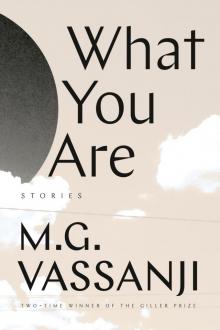 What You Are
What You Are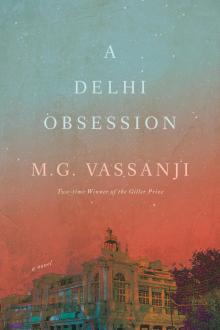 A Delhi Obsession
A Delhi Obsession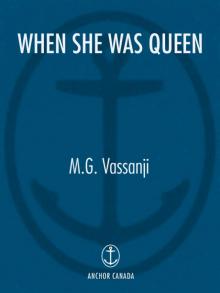 When She Was Queen
When She Was Queen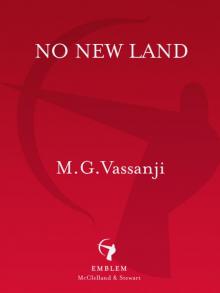 No New Land
No New Land Nostalgia
Nostalgia Mordecai Richler
Mordecai Richler The Book of Secrets
The Book of Secrets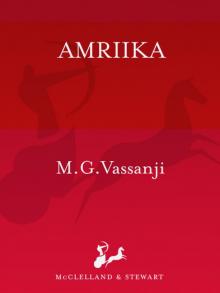 Amriika
Amriika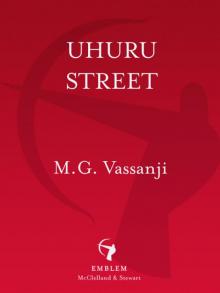 Uhuru Street
Uhuru Street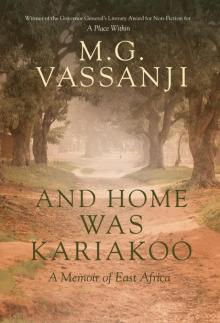 And Home Was Kariakoo
And Home Was Kariakoo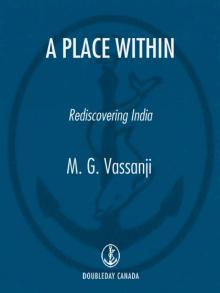 A Place Within
A Place Within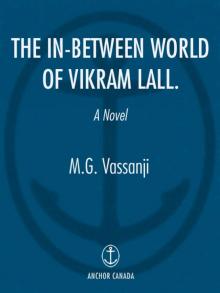 The In-Between World of Vikram Lall
The In-Between World of Vikram Lall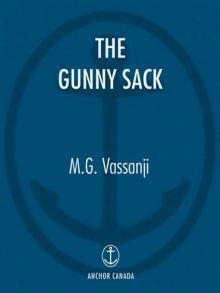 The Gunny Sack
The Gunny Sack